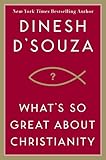

I've pointed out several differences between D'Souza"s and Dennett's approach to this debate so far. They use fundamentally different rhetorics, and have fundamentally different goals. They also mean fundamentally different things by belief, when it comes to God.
Another fundamental difference between the two has been emerging, and can be clearly seen in their final exchange.
Dennett's fundamental approach has been to see their conversation as a debate. He frequently addresses his response to D'Souza, rather than to the audience. He focuses on the issue, rather than personalities. He occasionally accuses D'Souza of misrepresenting an idea, but he never attacks him personally.
D'Souza, on the other hand, approaches the conversation as a battle. He addresses the audience almost all of the time. And he frequently aims his attacks at Dennett, and at people who agree with Dennett, personally, portraying them as dishonest, undemocratic, and elitist.
It's possible, of course, that all of this is just tactics: that he doesn't believe a word of the personal attacks, and that he is merely using them as political rhetoric—a useful way to get the audience on his side. It's also possible that he actually sees Dennett and his group as evil—as enemies that must be destroyed.
My guess is that the truth lies somewhere inbetween.
The world-view that D'Souza represents has need of villians, of enemies, in order to survive. His brand of Christianity is as dependent on belief in Satan as it is on belief in God, just as the neo-cons have a need for terrorists. It's part of the pattern of thought which turns to a primarily political rhetoric, which sees questions of belief as matters of choosing sides.
But it warps his ability to address the issue. And as the last round of the debate plays itself out, this becomes increasingly apparent.
Dennett's final remarks are short, and address points which D'Souza has recently made.
- He points out that D'Souza's argument that natural law requires a law-giver, is based on a misunderstanding of what a natural law is.
A natural law is a generalization about how nature works, not a rule that nature must obey. So, the question of "who made the law, and who made nature obey it" doesn't make sense.
If I notice that an apple always falls down, and never falls up, and I formulate that into a sentence which I call "The Law of Gravity", it doesn't mean that the apple is obeying the law—it merely means that I have made up a sentence which describes what the apple does when it falls. - He addresses D'Souza's most recent argument about the fine-tuning of the universe.
D'Souza, you will remember, had said that Dennett cited Lee Smolin's book, The Life of the Cosmos, which puts forth a new theory of how the universe came to exist, and why it is the sort of place it is. He then read Smolin's admission that the book was intended as speculation.
He used this to imply that Dennett had no real evidence to support his case, and that he was citing speculation as though it were evidence in his book.
Dennett responds to this by first pointing out that he had presented the material from Smolin as speculative in his book—as an interesting possibility.
He then goes on to clarify his point. People like D'Souza argue that the fine-tuning of the universe requires the existence of God, and the strength of their argument is that there are no other possible explanations. Dennett points to Smolin's theory, and a great many other possible explanations, and says that the God theory is only one speculation among many, and that in some ways it is more extravagant speculation than the others. - Finally, he addresses D'Souza's use of Stalin to attack atheism.
He admits that any powerful idea can be misused, and says that the idea that "If God is dead everything is permitted." does not follow.
He then points out that even if God did exist, and was the sole source of morality, we would still be on our own because we would have to decide which of God's self-appointed representatives to believe.
The way we would do this would be to use human reason to decide who was right about morality, and this is what we have to do in the absence of God, anyway. Morality is, and always has been, a human invention.
All of Dennett's arguments are aimed at the issues, except his one defense against D'Souza's misrepresentation of his book. There, he simply sets the record straight, without accusing D'Souza of intentional dishonesty, though he easily could have.
The nature of D'Souza's response is very instructive.






